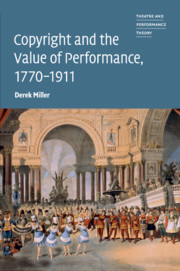Book contents
- Copyright and the Value of Performance, 1770–1911
- Theatre and Performance Theory
- Copyright and the Value of Performance, 1770–1911
- Copyright page
- Contents
- Acknowledgments
- Introduction
- 1 Performance's Valuable Propriety, 1770–1833
- 2 Ontologies of the Performance-Commodity, 1833–1886
- 3 Audiences, Actors, and Value, 1852–1911
- 4 The Performance-Commodity at Work, 1833–1911
- Epilogue: Valuing Performance Today
- Appendix: Timeline of Major Legislation and Litigation Affecting Performance Rights
- Works Cited
- Index
4 - The Performance-Commodity at Work, 1833–1911
Published online by Cambridge University Press: 11 August 2018
- Copyright and the Value of Performance, 1770–1911
- Theatre and Performance Theory
- Copyright and the Value of Performance, 1770–1911
- Copyright page
- Contents
- Acknowledgments
- Introduction
- 1 Performance's Valuable Propriety, 1770–1833
- 2 Ontologies of the Performance-Commodity, 1833–1886
- 3 Audiences, Actors, and Value, 1852–1911
- 4 The Performance-Commodity at Work, 1833–1911
- Epilogue: Valuing Performance Today
- Appendix: Timeline of Major Legislation and Litigation Affecting Performance Rights
- Works Cited
- Index
Summary
- Type
- Chapter
- Information
- Copyright and the Value of Performance, 1770–1911 , pp. 175 - 235Publisher: Cambridge University PressPrint publication year: 2018

